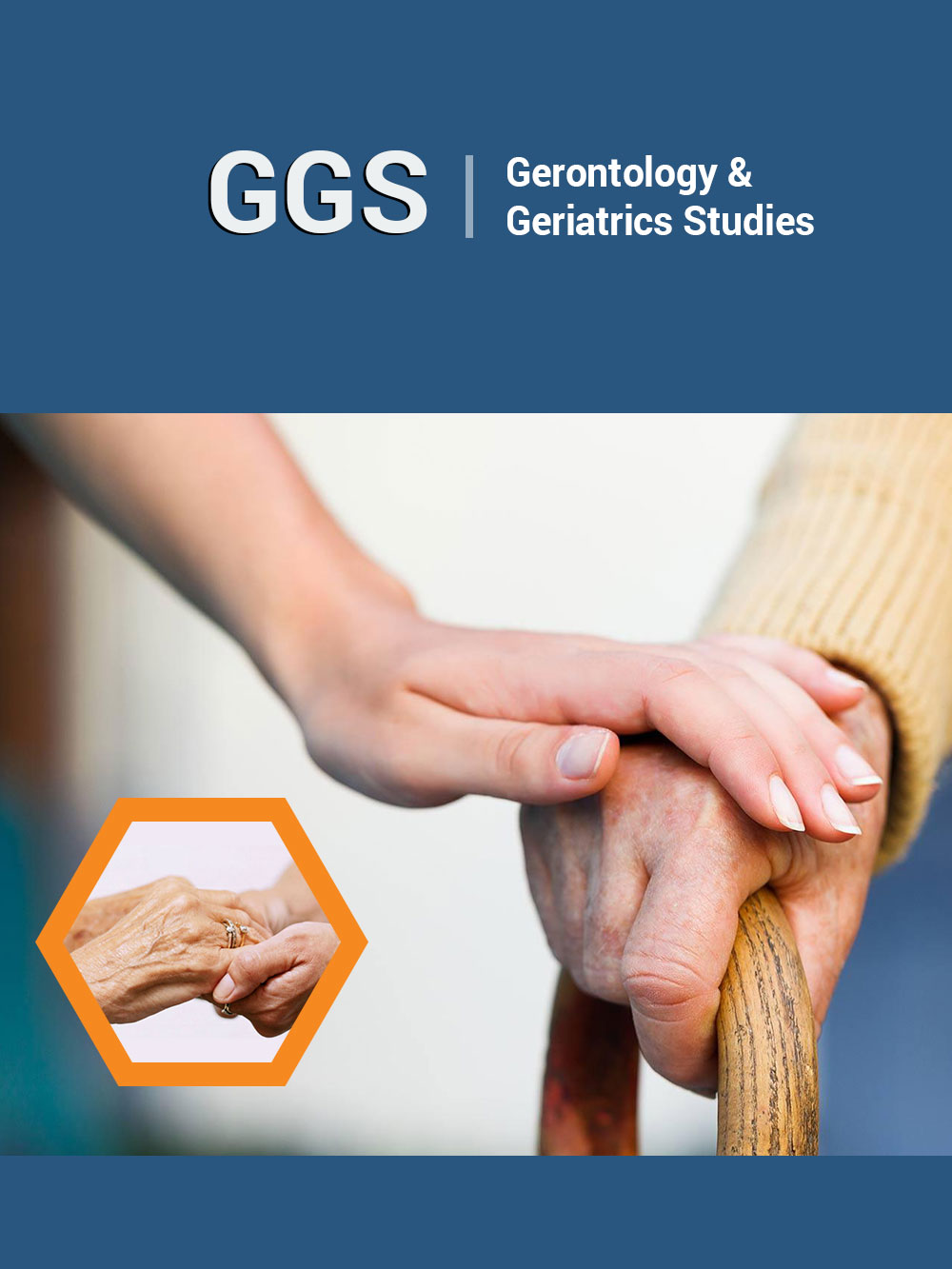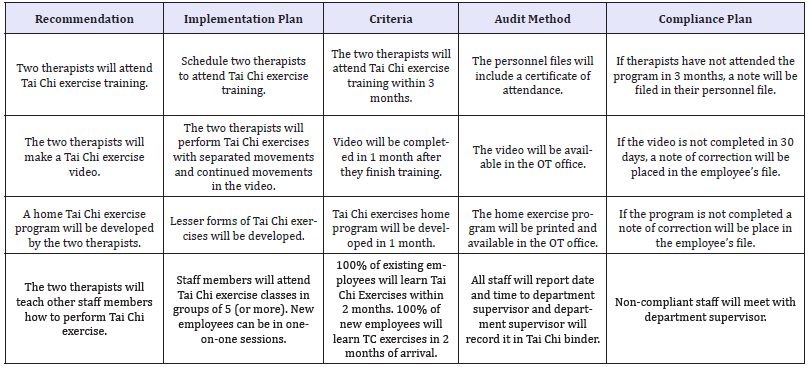- Submissions

Full Text
Gerontology & Geriatrics Studies
The Effectiveness of Tai Chi Exercises on Older Adults in Reducing Fear of Falling: An Evidence- Based Review
Hassan Izzeddin Sarsak*
Department of Occupational Therapy, School of Rehabilitation Sciences, University of Jordan, Saudi Arabia
*Corresponding author: Hassan Izzeddin Sarsak, Department of Occupational Therapy, Batterjee Medical College, Jeddah, KSA, Saudi Arabia
Submission: October 10, 2018;Published: October 29, 2018

ISSN 2578-0093Volume4 Issue1
Abstract
Objectives: this study was conducted to examine and review the evidence available regarding the effectiveness of Tai Chi exercises in reducing the fear of falling in older adults.
Results:our review revealed four studies suggesting that in older adults with a fear of falling, the Tai Chi program compared to no or alternative traditional educational program may produce a greater significant reduction in fear of falling.
Conclusion: Tai Chi exercises are effective and reduce the fear of falling in older adults significantly.
Keywords: Tai Chi; exercise; Education program; Older adults; Fear of falling
Introduction
Fear is an intellectual appraisal of threatening stimuli. Fear usually is considered a normal reaction to a realistic danger or threat to biological integrity or self-concept, but it is not normal to experience an overwhelming and prolonged state of fear. Human studies verify that fear circuitry is located in the amygdala. Sensory information is sent to the amygdala where it is projected to the hypothalamus, which in turn activates the sympathetic nervous system. It is the hypothalamic pituitary adrenocortical (HPA) axis that activates a defensive response when experiencing fear. Dysregulation of the HPA axis and structural changes in the hippocampus are associated with signs of fear and stress related disorders. When a person experiences extreme fear, the hormone cortisol is released from the adrenal gland above the kidney. Its job is to prepare the body for fight or flight. Elevated cortisol levels suppress the immune system and are associated with extreme fear and anxiety disorders. Fear of falling has been identified as a common psychological factor. Fear of falling could happen to people without any fall experiences [1]. Fear of falling could be increased with age, can lead to self-imposed activity restrictions (functional decline, decreased mobility, decreased social activity, depression, and low life satisfaction) (Myers, Fletcher, Myers, and Sherk, 1998). Tai Chi is widely used and is one of the best activities recommended to help decrease the effects of muscular rigidity through providing slow stretching movements [2]. The purpose of this study was to examine the evidence of Tai Chi exercises in reducing the amount of fear of falling in older adults. For the purpose of this study, we created a clinical/research PICO question (Population, Intervention, Comparison, and Outcome), a key to evidence-based decision [3].
The PICO formed for our study is as follows:
(P) In older adults with fear of falling
(I) Does a five-week Tai Chi program
(C) Compare to no/ alternative program
(O) Produce a greater reduction of fear of falling.
Methods
Review of literature and search strategy
A research has been made in the following databases: Ovid (MEDLINE, PsychINFO, and Global Health), and CINAHL. Keywords and Search items used to search articles for our study were Tai Chi, exercise, education program, older adults, geriatrics, and fear of falling. By combining the search results, we found articles on Tai Chi that discuss the relationship between Tai Chi and fear of falling among older adults. Based on the format of PICO question, four most relevant articles were selected for our study. Studies cited in the reference of the four articles along with other articles were also used to collect important information. After all, the strongest evidence-based article was chosen based on level of evidence and significance level to highlight and confirm our results and conclusions.
Results
Table 1:A summary of reviewed articles in relation to our PICO.

The four selected articles were related to the effectiveness of Tai Chi in reduction of fear of falling among older adults. All articles were related to our PICO question. A summary of the four articles in relation to our PICO is as follows (Table 1). Articles are presented based on treatment period.
Discussion
Zhang et al. [2] which examined the effects of Tai Chi Chuan on physiological function and fear of falling in the less robust elderly was selected as the strongest evidence-based article. Their target population was less robust elderly who are 70-year-old and older, with ambulatory ability, and live in unsupervised environment. Based on the hierarchy of levels of evidence in evidence-based practice, this study was a level II (Evidence obtained from at least one well designed RCT) [4-7]. Level of significance after 8 weeks at the Tai Chi Chuan exercise group as a result of performing 24 simplified forms of Tai Chi exercise was P=.006. Thus, clinical guidelines, recommendations, a plan and audit tool have been developed in our study to implement Tai Chi in clinical settings (Table 2).
Table 2:A summary of recommendations, plan, and audit tool.

Conclusion
Our review confirmed that Tai Chi exercises are effective and reduce the fear of falling in older adults significantly. Thus, clinical guidelines, recommendations, a plan and audit tool have been created in our study to implement Tai Chi programs in clinics. The clinical guidelines for recommended intervention, the plan, and the audit tool recommend therapists to apply Tai Chi exercises with older adults with fear of falling, ambulatory ability, and no significant cognitive problems.
Funding details
No funding was required.
Acknowledgement
None.
Conflict of interest
Author declares that there is no conflict of interest..
References
- Tinetti ME, Powell L (1993) Fear of falling and low self-efficacy: A cause of dependence in elderly persons. Journal of Gerontology 48: 35-38.
- Zhang J, Ishikawa Takata K, Yamazaku H, Morita T, Ohta T (2006) The effects of Tai Chi Chuan on physiological function and fear of falling in the less robust elderly: An intervention study for preventing falls. Archives of Gerontology and Geriatrics 42(2): 107-116.
- Richardson WS, Wilson MC, Nishikawa J, Hayward RS (1995) The wellbuilt clinical question: A key to evidence-based decision. ACP Journal Club 123(3): A12-13.
- Hughes I (2006) Action research in healthcare: what is the evidence? ALAR Journal 11(1): 29-39.
- Li F, Harmer P, Fisher KJ, McAuley E, Chaumeton N, et al. (2005) Tai Chi and fall reductions in older adults: A randomized controlled trial. Journal of Gerontology 60(2): 187-194.
- Sattin RW, Easley KA, Wolf SL, Chen Y, Kutner MH (2005) Reduction in fear of falling through intense Tai Chi exercise training in older, transitionally frail adults. Journal of the American Geriatrics Society 53(7): 1168-1178.
- Wolf SL, Barnhart HX, Kutner NG, Mcneely M, Coogler C, et al. (2003) Selected as the best paper in the 1990s: Reducing frailty and falls in older persons: an investigation of Tai Chi and computerized balance training. Journal of the American Geriatrics Society 51(12): 1794-1803.
© 2018Hassan Izzeddin Sarsak. This is an open access article distributed under the terms of the Creative Commons Attribution License , which permits unrestricted use, distribution, and build upon your work non-commercially.
 a Creative Commons Attribution 4.0 International License. Based on a work at www.crimsonpublishers.com.
Best viewed in
a Creative Commons Attribution 4.0 International License. Based on a work at www.crimsonpublishers.com.
Best viewed in 







.jpg)






























 Editorial Board Registrations
Editorial Board Registrations Submit your Article
Submit your Article Refer a Friend
Refer a Friend Advertise With Us
Advertise With Us
.jpg)






.jpg)














.bmp)
.jpg)
.png)
.jpg)










.jpg)






.png)

.png)



.png)






